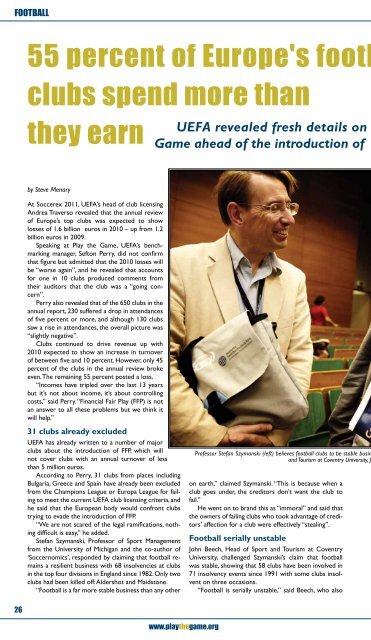playthegame - UniFlip
playthegame - UniFlip
playthegame - UniFlip
You also want an ePaper? Increase the reach of your titles
YUMPU automatically turns print PDFs into web optimized ePapers that Google loves.
FOOTBALL<br />
26<br />
55 percent of Europe's footb<br />
clubs spend more than<br />
they earn<br />
by Steve Menary<br />
At Soccerex 2011, UEFA’s head of club licensing<br />
Andrea Traverso revealed that the annual review<br />
of Europe’s top clubs was expected to show<br />
losses of 1.6 billion euros in 2010 – up from 1.2<br />
billion euros in 2009.<br />
Speaking at Play the Game, UEFA’s benchmarking<br />
manager, Sefton Perry, did not confirm<br />
that figure but admitted that the 2010 losses will<br />
be “worse again”, and he revealed that accounts<br />
for one in 10 clubs produced comments from<br />
their auditors that the club was a “going concern”.<br />
Perry also revealed that of the 650 clubs in the<br />
annual report, 230 suffered a drop in attendances<br />
of five percent or more, and although 130 clubs<br />
saw a rise in attendances, the overall picture was<br />
“slightly negative”.<br />
Clubs continued to drive revenue up with<br />
2010 expected to show an increase in turnover<br />
of between five and 10 percent. However, only 45<br />
percent of the clubs in the annual review broke<br />
even. The remaining 55 percent posted a loss.<br />
“Incomes have tripled over the last 13 years<br />
but it’s not about income, it’s about controlling<br />
costs,” said Perry. “Financial Fair Play (FFP) is not<br />
an answer to all these problems but we think it<br />
will help.”<br />
31 clubs already excluded<br />
UEFA has already written to a number of major<br />
clubs about the introduction of FFP, which will<br />
not cover clubs with an annual turnover of less<br />
than 5 million euros.<br />
According to Perry, 31 clubs from places including<br />
Bulgaria, Greece and Spain have already been excluded<br />
from the Champions League or Europa League for failing<br />
to meet the current UEFA club licensing criteria, and<br />
he said that the European body would confront clubs<br />
trying to evade the introduction of FFP.<br />
“We are not scared of the legal ramifications, nothing<br />
difficult is easy,” he added.<br />
Stefan Szymanski, Professor of Sport Management<br />
from the University of Michigan and the co-author of<br />
‘Soccernomics’, responded by claiming that football remains<br />
a resilient business with 68 insolvencies at clubs<br />
in the top four divisions in England since 1982. Only two<br />
clubs had been killed off: Aldershot and Maidstone.<br />
“Football is a far more stable business than any other<br />
UEFA revealed fresh details on<br />
Game ahead of the introduction of<br />
www.<strong>playthegame</strong>.org<br />
Professor Stefan Szymanski (left) believes football clubs to be stable busin<br />
and Tourism at Coventry University, J<br />
on earth,” claimed Szymanski. “This is because when a<br />
club goes under, the creditors don’t want the club to<br />
fail.”<br />
He went on to brand this as “immoral” and said that<br />
the owners of failing clubs who took advantage of creditors’<br />
affection for a club were effectively “stealing”.<br />
Football serially unstable<br />
John Beech, Head of Sport and Tourism at Coventry<br />
University, challenged Szymanski’s claim that football<br />
was stable, showing that 58 clubs have been involved in<br />
71 insolvency events since 1991 with some clubs insolvent<br />
on three occasions.<br />
“Football is serially unstable,” said Beech, who also

















